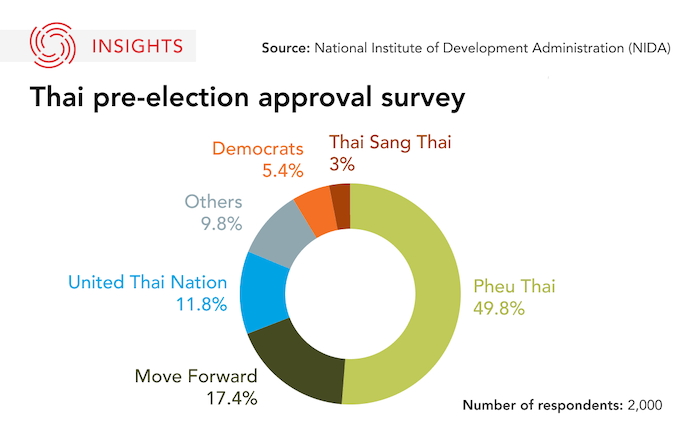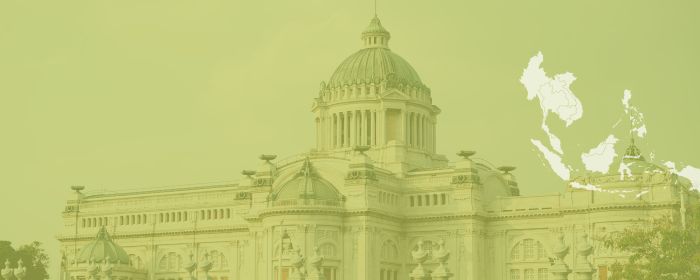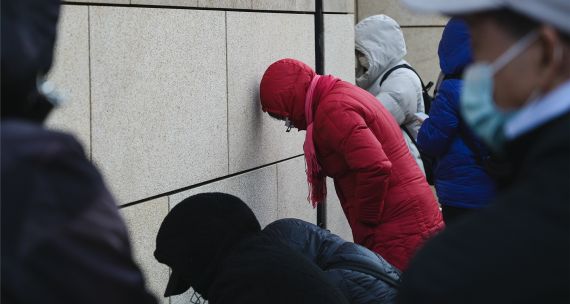The Takeaway
Thailand’s military-backed prime minister, Prayut Chan-o-cha, who has been in power for close to a decade, began the road to re-election on March 20 by dissolving Thailand’s House of Representatives. The country’s next general election is now scheduled for May 14. While the popularity of pro-democracy opposition parties is rising, the 2017 constitution, which was drafted after the 2014 coup, poses hurdles for these parties, and gives an edge to Prayut’s party and his allies. This puts Prayut in a favourable position to win, but he still faces an uphill battle of political infighting within the ruling coalition and rising public discontent over high inflation and a slow recovery from the COVID-19 pandemic.
In Brief
Prayut led the military-backed ruling party, Palang Pracharath Party (PPRP), and has been prime minister since the country’s 2014 coup. But on January 9, he left PPRP to join the United Thai Nation Party (UTNP), with whom he is seeking re-election in May.
A January 28 constitutional amendment to laws regarding political parties and the election of members of parliament (MPs) enabled Prayut to dissolve Thailand’s lower house before the end of its four-year term — scheduled for March 23 — and call for elections in May.
This will be the first election since the wave of pro-democracy protests in 2020-21 and the second general election under the 2017 constitution. Military-backed coalition parties PPRP, UTNP, and Bhumjaithai Party (BJTP), as well as pro-democracy parties Pheu Thai Party and Move Forward Party, will vie for the support of the country’s 52 million eligible voters.
Implications
Under the military-drafted 2017 constitution, election candidates must have a political affiliation for at least 90 days before the election, except when the House of Representatives dissolves. When dissolution occurs, the threshold is reduced to at least 30 days.
By dissolving the lower house before the end of its four-year term, Prayut’s UTNP-backed candidacy was legitimized and opportunities for party hopping were created. What’s more, as argued by PPRP, there is now more time for UTNP to recruit more MPs ahead of the elections. Party hopping and defection are also cropping up within other political parties, with MPs from the ruling coalition joining the opposition Pheu Thai Party, led by Paetongtarn Shinawatra, the daughter of ousted prime minister Thaksin Shinawatra.
Pro-democracy parties Pheu Thai and Move Forward are stiff competition for the military-royalist ruling coalition. In a recent pre-poll survey conducted March 2-8 by the National Institute of Development Administration, an educational institute, Pheu Thai secured an approval rating of 49.8 per cent and its leader Shinawatra was the most preferred candidate among respondents for the top job. Prayut’s UTNP came third with 11.75 per cent.

Prayut, once a popular leader, is seeing his credibility wither among voters who are increasingly frustrated with high inflation and a sluggish economic recovery. If he is reappointed as prime minister, he will only be able to serve two years out of the four-year term due to the eight-year constitutional limit for prime ministers.
Opposition parties must secure the support of at least 376 MPs and senators to gain power. Military-backed parties, however, have an unfair advantage when it comes to securing the support of the 250 senators, who were appointed by the military in 2017. Per the constitution, senators have the power to elect a prime minister together with the lower house twice. In 2019, senators elected Prayut, PPRP’s candidate. Senators can vote once more in the next election to elect a prime minister who will likely hail from a military-backed party. Opposition parties have complained about the “undemocratic” nature of the country’s senate and have attempted to curb its power. However, unless a new constitution is formed, it is unlikely that the senate will strip itself of its own powers.
What’s Next
- Youth led pro-democracy protests
Major pro-democracy protests unfolded in Thailand between 2020 and 2021. Demonstrators criticized the democratic regression occurring in the country, evidenced by the dissolution of the Future Forward Party (a progressive opposition party dissolved by the government in 2020 for "violation of election laws regarding donations to political parties"), the appointment of military-aligned figures to the senate, and the expansion and use of lèse-majesté laws by Prayut to silence opposition. With the protesters failing to achieve any sort of reforms, more protests are expected to take place in the weeks leading up to the elections.
- Prayut signals coalition possibilities
Prayut has indicated that another coalition government is likely if military-royalist parties UTNP, PPRP, or BJTP are unable to establish a government independently. The potential for a coalition government in Thailand has raised concerns about political infighting, as both the PPRP and BJTP have put forward their own candidates for prime minister. Former deputy prime minister Prawit Wongsuwon is the PPRP's choice, while the BJTP has picked public health minister Anutin Charnvirakul. For now, there is no clear answer as to who will lead Thailand if a coalition government emerges.
• Produced by




